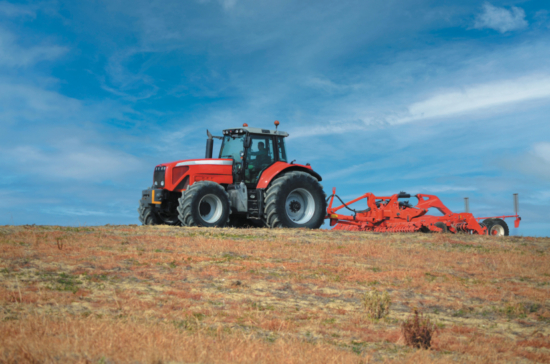BKT compares radial & cross-ply agri tyres
 The cross-ply AW 708 “particularly resistant to cuts, tears and stubble” (Photo: BKT)
The cross-ply AW 708 “particularly resistant to cuts, tears and stubble” (Photo: BKT)
Radial or cross-ply? The choice is easy for car drivers but more complicated when choosing the right tyre for agricultural equipment. BKT has published guidance to help end users decide upon the right fitment for their machinery.
The off-highway tyre specialist stresses that it is difficult to provide a universal answer and choosing the right tyre must be carefully considered, taking into account a range of factors such as working habits, soil condition, load and vehicle type. For example, in the case of machinery for cultivation and tillage, close attention should be paid to rolling resistance and circumference.
BKT notes, however, that while “countless factors” influence the choice of a specific tyre, choosing radial solutions over bias or cross-ply tyres can make all the difference. “Thanks to their structure, compared to bias tyres, radial solutions offer lower rolling resistance, ensuring less and more uniform wear and tear compared to bias solutions. This also means greater fuel savings for the farmer,” states the tyre maker.
Radial tyres are characterised by a larger footprint on the ground which allows for a better distribution of machine weight while at the same time limiting the compaction of agricultural soil, preserving the well-being of crops and increasing crop yield. Furthermore, in most cases radial tyres have a higher load capacity than cross-ply at the same or lower pressure. And as is now common knowledge, radials equipped with VF and IF technologies can carry even heavier loads at lower pressure than standard tyres. Cross-ply tyres must typically operate at maximum pressure in order to avoid damage to their casing.
Last but not least, radial tyres can reach speeds of over 25 mph or 40 km/h when adjusted to the correct pressure, allowing users to speed up operations.
BKT has developed several radial solutions for agricultural equipment, including:
RIB 713, a steel-belt tyre equipped with IF technology capable of supporting heavier loads at lower pressures. RIB 713 provides a larger footprint with uniform weight distribution while also reducing soil compaction. The belted steel structure guarantees extraordinary puncture resistance and therefore greater protection against the penetration of stalks and stubble. Speed category D allows the tyre to be driven on the road at up to 40 mph or 65 km/h.
SR 713 is an all-steel radial with VF technology. BKT says this tyre is characterised by a sturdy casing with multilayer steel belts and a tread with a multiple groove design to guarantee low rolling resistance, in addition to uniform wear and tear of the tread. Thanks to a wide footprint, this VF tyre ensures reduced soil compaction. “SR 713 stands out for both its performance and its reliability, offering excellent levels of speed also on the road,” comments BKT.
BKT designed AW 711 for large equipment used for tillage and sowing. The size range covers standard, IF and VF versions. The manufacturer says the choice of tread compound ensures a long product life cycle when used on both soft and hard surfaces, as well as low rolling resistance when used on-road.
Rugged cross-ply
“Generally, therefore, radial products have the right characteristics for application on agricultural equipment. However, bias tyres are not without their merits. For example, the resistance to wear and tear and the ability to absorb side impacts,” states BKT. “It therefore depends on the needs of each user, because each activity is unique and specific.”
For this reason, BKT offers numerous cross-ply models suitable for the most diverse uses: from driving on lawns to transporting fodder, passing through hay bale presses. BKT tyres for agricultural equipment include:
I-1, a high-speed tyre designed specifically for transport in the field and on the road. BKT says the tyre’s tread pattern ensures a prolonged life cycle, even in adverse conditions and with the presence of stubble in the field.
RIB 774 is a BKT tyre line designed for agricultural equipment such as balers. This line includes the models RIB 774 (A), RIB 774 (B) and RIB 774 (C), products the manufacturer says provide long life cycle and high load capacity.
Finally, the AW 708 is said to be “particularly resistant to cuts, tears and stubble.” Some sizes are also available in a ‘special’ version with an ultra-resistant compound or in a ‘stubble resistant version that provides additional protection against stubble.
“The world of agricultural equipment is really vast and BKT has thought of each specific application, responding concretely with a quality product which always guarantees maximum efficiency,” the tyre maker concludes.

 Giti
Giti


Comments